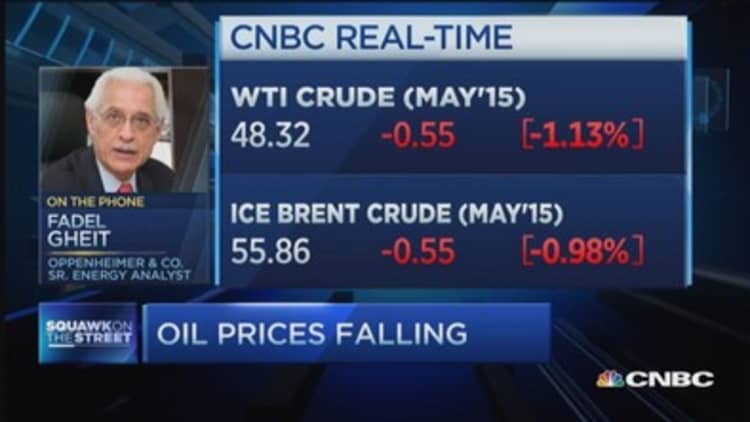
Oil prices fell for the second straight session on Monday as Iran and six world powers negotiated a deal for Tehran's nuclear program that could end Western sanctions, allowing the OPEC member to ship more crude into an already flooded market.
Officials close to the talks have said progress has been made and many investors believe a deal is in the making. Few expect the talks to end without some sort of agreement.
U.S. crude closed down 19 cents at $48.68 a barrel, off an earlier low of $47.61. Brent crude was down 10 cents at $56.31 a barrel after State Department officials said there is a 50/50 chance of a framework agreement with Iran.
Read More Iran's nuclear deal and how it could affect oil
"We're likely to stay jittery through the day on any headline coming out of Lausanne, and the stronger dollar isn't helping oil either," said analyst Phil Flynn of Price Futures Group in Chicago.
The dollar rose as the euro slumped on worries over whether Greece would secure aid before it runs out of cash in three weeks. A stronger dollar makes commodities denominated in the greenback, such as oil, more costly for holders of other currencies.



Brent and U.S. crude tumbled 5 percent on Friday on worries of an Iran nuclear deal by March 31.
Read More This could push oil prices higher: Strategist
Tehran is keen to recover market share lost under the U.S.-led sanctions that have restricted its crude exports to just 1 million barrels per day from 2.5 million bpd in 2012.
Oil markets are well supplied, with recent figures showing global production outstripping demand by around 1.5 million bpd.
"Regarding Iran, there are two possible outcomes: a framework deal or an extended deadline," Bjarne Schieldrop, chief commodities analyst at SEB Markets in Oslo, told the Reuters Global Oil Forum.
Societe Generale analyst Michael Wittner said if a framework agreement was reached, it was logical to expect "an immediate bearish knee-jerk reaction in the markets, with oil prices quickly losing on the order of $5."
Read MoreAngola joins Venezuela among biggest losers of oil's tumble
Few investors expect the Organization of the Petroleum Exporting Countries, which pumps around a third of the world's oil, to restrain production to help push up prices.
Lower oil prices have encouraged some oil and gas companies to stop drilling, particularly in the United States, but this is unlikely to affect oil production until later this year.
"The current rig count is pointing to U.S. production declining slightly sequentially in 2Q15 and 3Q15," Goldman Sachs said, adding that activity could bounce back in 2016 as drillers benefit from falling production costs.

